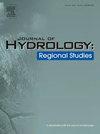Analysis of water supply and usage cooperation strategies and evolutionary game among multiple stakeholders in water network
IF 4.7
2区 地球科学
Q1 WATER RESOURCES
引用次数: 0
Abstract
Study region
Cooperation in water supply and usage under the national water network construction framework in China.
Study focus
The development of water network projects can significantly alleviate water resource scarcity while enhancing the regional carrying capacity of water resources. The effectiveness and efficiency of water supply through these networks depend on the cooperation of multiple stakeholders, including water source transferring areas, receiving areas, and the operation of the water network infrastructure itself. This study integrates China’s current practices in water network construction and operation, identifies three typical water supply modes, and analyzes the behavioral strategies of stakeholders. Evolutionary game models are developed to explore the stable evolutionary pathways for cooperation in water supply and usage.
New hydrological insights for the region
The water usage strategies of water receiving areas significantly influence the stable evolution strategies of tripartite game system. Both supply-side competition and demand-side competition can ultimately evolve into water price competition. The business strategies of enterprises are highly uncertain, and when they possess strong bargaining power, there is a high probability of water supply price increases. Therefore, price regulation measures are essential to safeguard social welfare. To prevent the demand side from falling into price competition, it is recommended that mutual water usage negotiation mechanisms be established between water receiving areas, with higher-level government departments intervening in the macro-allocation of water resources. These insights provide valuable guidance for coordinating regional water demand, alleviating supply-demand contradictions, and reforming regional integrated water pricing.
求助全文
约1分钟内获得全文
求助全文
来源期刊

Journal of Hydrology-Regional Studies
Earth and Planetary Sciences-Earth and Planetary Sciences (miscellaneous)
CiteScore
6.70
自引率
8.50%
发文量
284
审稿时长
60 days
期刊介绍:
Journal of Hydrology: Regional Studies publishes original research papers enhancing the science of hydrology and aiming at region-specific problems, past and future conditions, analysis, review and solutions. The journal particularly welcomes research papers that deliver new insights into region-specific hydrological processes and responses to changing conditions, as well as contributions that incorporate interdisciplinarity and translational science.
 求助内容:
求助内容: 应助结果提醒方式:
应助结果提醒方式:


